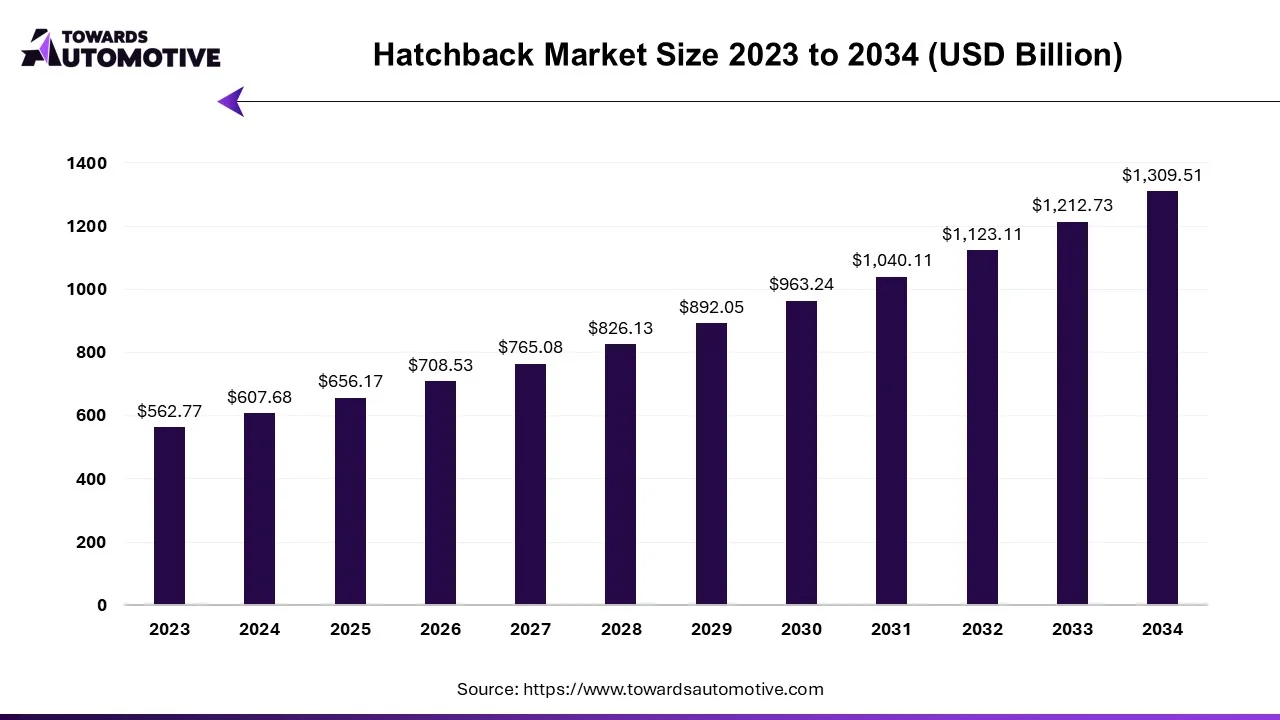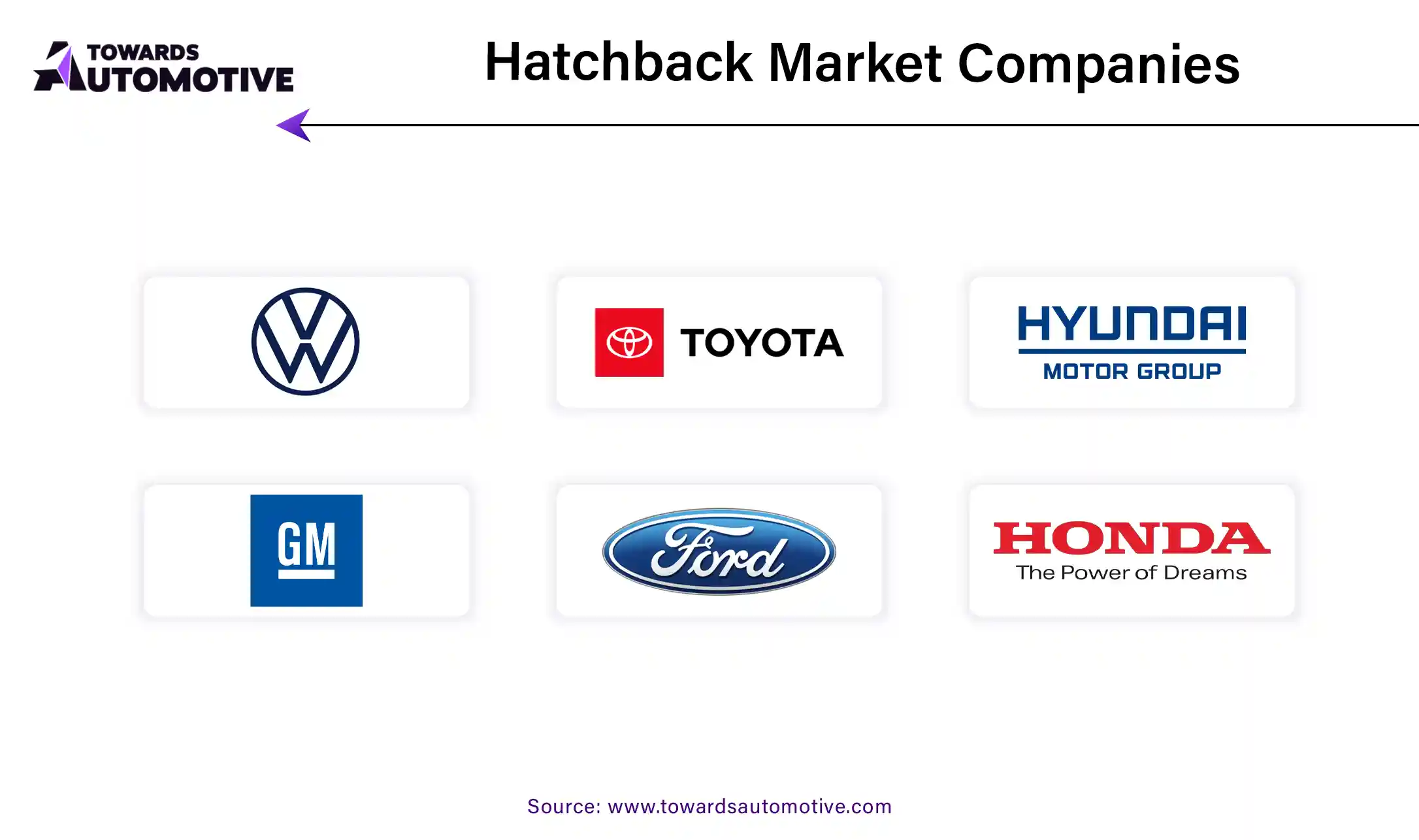Hatchback Market Size, Share & Growth Projections
The hatchback market is projected to reach USD 1,309.51 billion by 2034, growing from USD 656.17 billion in 2025, at a CAGR of 7.98% during the forecast period from 2025 to 2034.

The hatchback market is experiencing significant growth, driven by evolving consumer preferences, technological advancements, and urbanization trends.
Embracing Versatility
Hatchbacks are redefining urban mobility with their compact size, agile handling, and versatile design. Offering the perfect blend of style, practicality, and fuel efficiency, hatchbacks appeal to a wide range of consumers seeking economical and maneuverable vehicles for urban commuting, weekend getaways, and daily errands. From city dwellers to young families, hatchbacks cater to diverse lifestyles and transportation needs, making them a popular choice in both developed and emerging markets.
Key Features and Functions of Hatchback Vehicles
- Compact Design: Hatchbacks feature a compact footprint and a rear hatch door, maximizing interior space and cargo capacity within a small footprint. Their agile dimensions make them ideal for navigating congested city streets, tight parking spaces, and narrow alleyways with ease, enhancing urban maneuverability and practicality for everyday driving.
- Fuel Efficiency: Hatchbacks are renowned for their fuel-efficient performance, thanks to lightweight construction, aerodynamic design, and efficient powertrain technologies. With options ranging from petrol and diesel engines to hybrid and electric drivetrains, hatchbacks offer eco-friendly transportation solutions that reduce fuel consumption, emissions, and environmental impact, aligning with sustainability goals and regulatory requirements worldwide.
- Versatile Cargo Space: The rear hatch door of hatchback vehicles provides convenient access to a versatile cargo area, allowing drivers to transport bulky items, luggage, and sports equipment with ease. Folding rear seats further enhance cargo flexibility, enabling hatchbacks to accommodate large items or create additional cargo space as needed, making them ideal for weekend adventures, shopping trips, and outdoor activities.
Market Dynamics and Trends
- Rise of Compact Urban Mobility: Growing urbanization and congestion in major cities worldwide are driving demand for compact and maneuverable vehicles like hatchbacks. Their small footprint, agile handling, and efficient fuel consumption make hatchbacks well-suited for navigating urban environments, reducing commuting stress, and improving accessibility in densely populated areas.
- Shift Towards Electric Mobility: The transition towards electric mobility is reshaping the hatchback market, with automakers introducing electric hatchback models to meet growing consumer demand for zero-emission vehicles. Electric hatchbacks offer clean, quiet, and efficient transportation solutions for urban commuters, delivering eco-friendly mobility without compromising performance, range, or driving experience.
- Integration of Connectivity Features: Hatchbacks are incorporating advanced connectivity features, including smartphone integration, touchscreen infotainment systems, and wireless connectivity, to enhance the driving experience and connectivity on the go. These features enable drivers to access navigation, entertainment, and communication services seamlessly, transforming hatchbacks into connected hubs for digital lifestyles and smart mobility solutions.
Asia-Pacific Expected to Grow
As we look ahead to the automotive landscape in the Asia-Pacific region, the hatchback market emerges as a formidable force, poised to capture a substantial 48% share of revenue by the year 2023. This dominance underscores the region's status as one of the largest and most rapidly expanding hatchback markets globally, driven by a confluence of factors shaping consumer preferences and market dynamics.
A primary catalyst fueling the meteoric rise of the hatchback market in the Asia-Pacific region is the relentless march of urbanization, accompanied by a surge in disposable income levels. As cities swell with burgeoning populations, the demand for small, fuel-efficient vehicles capable of navigating congested urban streets with agility and ease has skyrocketed. In this context, hatchbacks emerge as the vehicle of choice, offering a perfect blend of compactness, efficiency, and maneuverability tailored to the demands of urban living.
The region's high population density and rapid urban expansion further amplify the appeal of hatchback vehicles, particularly in densely populated areas where parking space is at a premium. Unlike larger cars, hatchbacks boast a compact footprint that makes them ideally suited for navigating tight city streets and squeezing into narrow parking spots with effortless grace, rendering them indispensable companions for urban dwellers seeking practicality without compromising on comfort or style.
Shifting preferences of millennials and urban buyers in the Asia-Pacific region underscore the growing allure of hatchbacks, which are increasingly coveted for their blend of performance, versatility, and modern amenities. Whether used as primary vehicles for daily commutes or as supplementary vehicles for city excursions, hatchbacks offer a compelling proposition that resonates with the evolving lifestyles and preferences of discerning consumers.
In essence, the ascendance of the hatchback market in the Asia-Pacific region reflects a convergence of factors driving its unprecedented growth, including urbanization, rising disposable incomes, and a growing appreciation for the practicality and versatility offered by these compact vehicles. As hatchbacks continue to assert their dominance on the automotive landscape, they stand poised to redefine the contours of urban mobility in the Asia-Pacific region, offering a compelling blend of efficiency, convenience, and modernity to a burgeoning population of discerning consumers.
Market Segmentation and Regional Outlook
By Fuel Type
- Petrol
- Diesel
- Hybrid
- Electric
By Size Class
- Subcompact Hatchbacks
- Compact Hatchbacks
By End-User
- Individual Consumers
- Fleet Operators
- Car Rental Companies
By Region
- North America
- United States
- Canada
- Mexico
- Rest of North America
- Europe
- Germany
- United Kingdom
- France
- Italy
- Rest of Europe
- Asia-Pacific
- China
- Japan
- India
- Rest of Asia-Pacific
- Latin America
- Brazil
- Rest of Latin America
- Middle East and Africa
- South Africa
- Rest of Middle East and Africa
Challenges and Opportunities
- Market Competition and Differentiation: Intense competition in the hatchback market poses challenges for automakers to differentiate their offerings and capture consumer interest. However, opportunities lie in innovation, customization, and value-added features that cater to specific customer segments, such as urban commuters, eco-conscious drivers, and tech-savvy millennials.
- Infrastructure Development: The success of electric hatchbacks hinges on the availability and accessibility of charging infrastructure, which remains a key challenge in many regions. Investing in charging networks, infrastructure expansion, and public-private partnerships presents opportunities to accelerate electric vehicle adoption and address range anxiety, unlocking new markets and growth opportunities for electric hatchback manufacturers.
- Regulatory Compliance and Emissions Standards: Stricter emissions regulations and sustainability targets are driving automakers to develop cleaner and more efficient hatchback models that comply with regulatory standards. Investing in research and development (R&D) to improve powertrain efficiency, reduce emissions, and enhance vehicle electrification technologies presents opportunities for automakers to stay ahead of regulatory requirements and meet evolving consumer preferences for eco-friendly transportation solutions.

Key Players in the Hatchback Market
The hatchback market features a diverse ecosystem of automakers, suppliers, and technology providers.
Some of the prominent players in the market include:
- Volkswagen Group
- Toyota Motor Corporation
- Hyundai Motor Group
- General Motors Company
- Ford Motor Company
- Honda Motor Co., Ltd.
- Renault Group
- Nissan Motor Corporation
- BMW AG
- Daimler AG
Recent Developments in the Hatchback Market
- In December 2023, Volkswagen Group unveiled its latest electric hatchback model, the Volkswagen ID.3, featuring a sleek design, long-range electric drivetrain, and advanced connectivity features. The ID.3 offers emission-free urban mobility, smart connectivity, and customizable driving modes, catering to the growing demand for eco-friendly and tech-savvy hatchbacks in urban markets.
- In November 2023, Toyota Motor Corporation introduced the Toyota Yaris Cross hybrid hatchback, combining compact SUV styling with hybrid powertrain technology. The Yaris Cross offers fuel-efficient performance, versatile cargo space, and advanced safety features, making it an ideal choice for urban commuters and eco-conscious drivers seeking practicality and sustainability in a compact package.
- In October 2023, Hyundai Motor Group announced its plans to launch multiple electric hatchback models under its Hyundai and Kia brands, targeting the rapidly growing electric vehicle market. The electric hatchbacks leverage Hyundai's E-GMP platform and Kia's Electric-Global Modular Platform (E-GMP), offering long-range electric drivetrains, fast-charging capabilities, and advanced driver assistance systems for enhanced safety and convenience.
- In September 2023, General Motors Company unveiled the Chevrolet Bolt EUV electric hatchback, expanding its electric vehicle lineup with a spacious and versatile crossover model. The Bolt EUV offers long-range electric driving, advanced driver assistance features, and seamless connectivity, catering to urban commuters and families seeking eco-friendly and tech-forward transportation solutions.
- In August 2023, Ford Motor Company introduced the Ford Fiesta Active hybrid hatchback, combining rugged crossover styling with hybrid powertrain technology. The Fiesta Active offers fuel-efficient performance, elevated ground clearance, and enhanced driving dynamics, making it an ideal choice for urban adventurers and outdoor enthusiasts seeking versatility and efficiency in a compact package.



